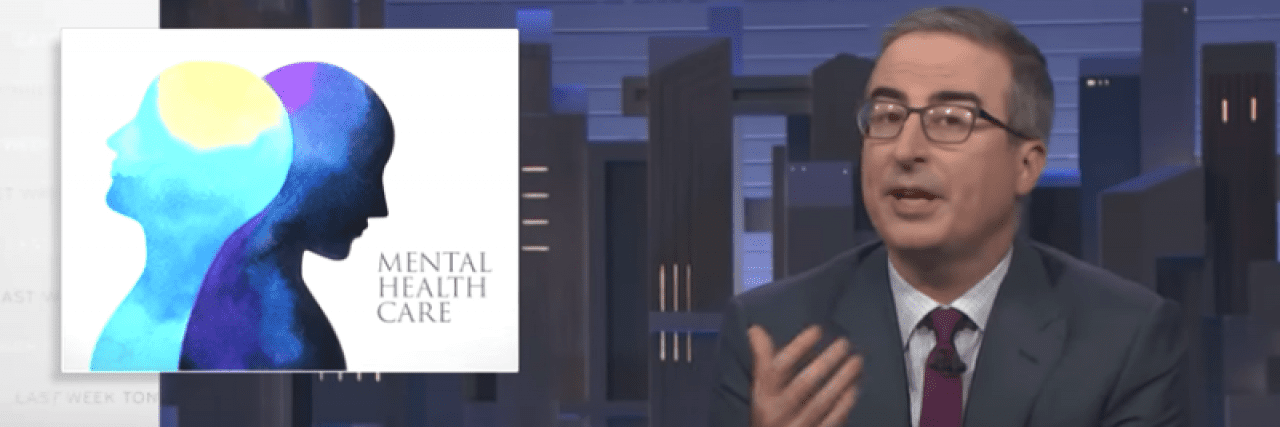Don't Miss John Oliver's Segment on the U.S. Mental Health Crisis
You’ve no doubt heard that the mental health care system in the U.S. is broken. You’ve probably experienced that for yourself. But have you heard what John Oliver had to say about it? On August 1, on Oliver’s “Last Week Tonight” program, the comedian/commentator devoted a full 25 minutes to examining the flaws that plague mental health care.
During the broadcast, Oliver presented appalling statistics (some of which even I had never heard before) and clips of interviews with participants in the mental health system, including people who have been affected by it, practitioners, and insurance executives. With his trademark sardonic humor, exasperated outrage, and comic zingers, Oliver deftly skewered the insurance industry and remote mental health companies, among other targets.
It was an enlightening and satisfying performance.
Here are some of the highlights.
Oliver started with a flashback from the 1950s of women entering a beauty parlor (!) to receive makeovers that were supposed to solve their mental problems. “I don’t know what’s more alarming there — nurses being forced to take on the skills of a Sephora brand ambassador or the fact that ‘can make-up cure sad?’” Then he tackled the PSA on mental illness stigma featuring Harrison Ford, which was designed to make discussions of mental health “cool and trendy” and dissed the gallbladder for some reason.
Next, he went through some stats on why such a PSA was necessary – the lack of access to mental health care, particularly since “for every 10 clinicians entering work in mental health clinics there, 13 leave. And if we continue at that rate, one day, we’re going to wind up with negative therapists.”
Oliver noted that nearly 85% of all psychologists are white, and ran an interview with a Black couple. The man said that he “couldn’t find a black man to save my life,” which Oliver said was “something you expect to hear about the crowd on January 6th, or all 10 seasons of “Friends.”
He also played a video of another man who couldn’t find treatment. His friends said, “Everything will be fine tomorrow. Suck it up, buttercup,” a response that to him meant “a 12-pack of something or a bottle of something.”
Oliver also reported on the fact that hospital ERs are overrun, with one interviewee experiencing a stay of 27 days there, and then receiving advice to go from the ER to a doctor. Oliver noted that 27 days in an ER is “not calming” and that seeking help is serious, that “you can’t just put off mental healthcare indefinitely. It’s not a check engine light.”
Some of Oliver’s most biting comments were reserved for AI programs that claim to counsel users on mental health issues. One of the free services was Woebot – “Bot as in robot and ‘woe’ as in ‘Whoa, that’s a dumb name.'” Their mascot is a robot waving a wrench (“He’s going to fix my brain with that!”). And when questioned about anxiety and lack of sleep, which affect 18% of people, the AI responded, “I can’t wait to hop into my jammies later.” Oliver also reported that when Woebot was confronted by the BBC with a test case of a 12-year-old reporting sexual abuse, it replied with the comment that it “shows me how much you care about connection, and that’s really kind of beautiful.”
He did note that teletherapy is valuable and it can fill some of the gaps in care. But Oliver also highlighted investigations of sites that were “pill mills,” one of which claimed that 95% percent of their users “should get a scrip.” Noting that it was not 100%, Oliver compared it to the saying, “It’s not arson if you only burn most of a building down.”
Regarding lack of accessibility and insurance parity despite laws requiring it, the program noted that the issue was complicated by finding a provider who will take your insurance. The Labor Department has investigated only 74 claims against insurance companies in the past year (but closed only 12 of the complaints) and has issued fines only 13 times since 2017.
And insurance payments are often based on their own opinions on when a treatment is “medically necessary.” Oliver likened it to an insurance company, saying, “Imagine an insurance company reversing their decision in the middle of any other serious treatment. ‘Hey, we love how this heart surgery is going, just popping in to say, it’s done. Yeah, it’s done now. Hit the showers, everyone, great job. Don’t bother closing anything up, that’s not medically necessary.’”
California, Oliver noted, requires insurers to “base medical necessity determinations on current, generally accepted standards of mental health care, instead of just making up the criteria for themselves.”
Insurance companies also have “ghost networks” that offer patients providers who aren’t taking new patients or even practitioners who have died. Phone numbers can be wrong too, some of them reaching “jewelry stores and boutiques,” which Oliver admitted that, “to be fair, if you’re a woman in the 1950s, a boutique and a jewelry store is apparently the only mental health care you need.”
The segment ended with the statement and plea, “It can’t be the case that, when people ask for help, our only option is to tell them to ‘suck it up, buttercup.’”
We can only hope that “Last Week Tonight’s” take on the U.S. mental health care system will reach its literally millions of viewers with the news that something needs to be done – and soon. You can see the whole segment here or on John Oliver’s official website. It’s definitely worth a visit.
Image via Last Week Tonight’s YouTube

